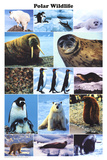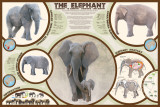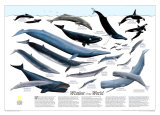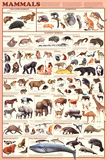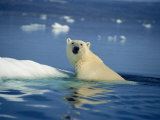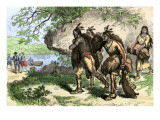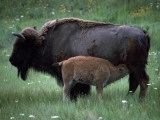|
|
Mammals Educational Posters, Art Prints & Charts
for the classroom and home schoolers.
|
science posters > biology > zoology > MAMMALS < culinary food < social studies
|
|
MAMMALS - members of the class Mammalia, are warm-blooded vertebrates characterized by mammary glands in the female, and hair or fur. Mammals include wild and domestic, land, sea and flying animals.
|
|
|
|
|
|
|
|
|
|
Elephants are the
largest land mammals. |
Whales are the largest marine mammals;
the blue whale is the largest animal ever known to exist. |
|
|
|
|
|
|
|
|
| The Giant Panda, a native to China, is a bear that eats mostly bamboo. The panda has become an emblem of China with its distinctive black and white coat. |
The polar bear, a semi-aquatic marine mammal, is adapted for life on a
combination of land, sea, and ice.
• Canada posters |
|
|
|
Bats, in the Chiropetera order, are the only true flying mammal, flapping their webbed forelimbs to achieve and maintain flight.
Species of bats are spread around the world, though they are not found in the polar regions or some isolated islands. Most bats eat insects (insectivores), some eat fruit (frugivores), a few species eat fish and crusteans, and three species are known as Vampire bats that drink blood. Because they are mammals, baby bats are nursed by their mothers.
Bats are important to ecological systems for controlling insect populations, pollinating plants, and distributing seeds. Places where bats roost are the source of bat dung, a nutrient rich fertilizer known as guano. FYI -Bat caves were an important resource for the South in the US Civil War as guano provided saltpeter to make gunpowder.
Bats hunt at dusk to avoid competiton with birds, and as night feeders their eyes are not highly developed. They navigate by a perceptual system called echolocation (echo+location) where they emit sound that bounces back to their sensitive ears, letting them know what objects are in their flight path. Human development of radar systems are biomiciry of the bats natural activity.
In Western culture bats are associated with fear, such as Dracula, and good, such as Batman. In other cultures bats are seen as sacred, a trickster spirit, or a symbol of longevity. The opera Die Fledermaus translates as “The Bat”.
FYI - Chiroptera, from Greek, means cheir=hand+pteron=wing.
|
|
|
|
|
|
|
Mice and voles are rodents which are characterised by two continuously growing incisors which must be kept short by gnawing.
Shrews, which have the highest brain to body mass ratio of all animals (nearly 10%) including humans, are not rodents.
|
|
|
Aardvarks are burrowing, nocturnal mammals native to Africa.
|
|
|
|
|
Beaver, the largest rodent in North America (and the third largest rodent in the world, after the South American capybara and the Eurasian beaver) is also an emblem of Canada. The beaver fur was prized in Europe and brought trappers and traders to North America, leading to the decimation of Native American indigenous peoples.
FYI - Rodents (order Rodentia) are mammals characterized by two continuously growing incisors in the upper and lower jaws. The phrase “busy as a beaver”, could refer to the beaver having to constantly gnaw in order to keep the incisors worn down.
Mice, rats, squirrels, porcupines, beavers, chipmunks, and guinea pigs are common rodents. Rodents have been historically seen as pests, spreading disease and destroying crops, I personally think a hampster running on a squeaky wheel at 1 am is also a pest ;-).
|
|
|
|
|
Pinnipeds are fin-footed, semi-aquatic mammals comprising the families Odobenidae (the walrus), Otariidae (eared seals, including sea lions and fur seals), and Phocidae (earless seals).
The word pinniped from the Latin pinna = wing or fin + ped = foot.
“THE DESTINIES of men and seals have been intertwined since the first hunters found themselves sharing a coastal habitat with pinnipeds. The history that followed is an unusually bloody one" Nearly all species of pinnipeds, meaning “fin-footes.” have been hunted at one time or another for their meat, oil, ivory, or luxuriant fut. Today some are still pursued extensively, while others are sheltered as endangered. The Caribbean monk seal may already be extinct. A few pinniped species are objects of international debate over their status and harvesting.
Three families of creatures share the finned feet that make these mammals equally at home on land or in the water, uniquely designed for an amphibious existence. True seals (phocids) hunch along on land using only their clawed fore-flippers. Sea lions and fur seals (otariids) use all four limbs for locomotion on land. Another difference is in the ear: Phoecids have no external ear, while the otariids have a visible earflap. The walrus (odobenid), neither seal nor sea lion, has no external earflap but can walk on all fours.”
|
|
|
|
American Bison, also known as buffalo, is currently the largest land animal in North America.
A valued part of Plains Indians resources the buffalo provided food, leather, sinew for bows, grease, dried dung for fires, and even the hooves could be boiled for glue.
Both Indians and whites were responsible for nearly destroying the buffalo. Wikipedia reports that the southern plains Comanches killed about 280,000 buffalo a year into the 1830s, then a 10-15 year drought weakened the herds, and finally wholesale commercial killing of buffalo, enabled by the invention of a repeating firearm and sanctioned in order to both force the tribes that depended on the buffalo onto reservations, cleared the land for domestic cattle and provided hides for the eastern markets.
The buffalo is also the state animal of Wyoming, Oklahoma, and Kansas; the showman William F. Cody, aka as Buffalo Bill, produced a Wild West Show in the late 19th century.
|
|
|
|
Cats Poster
Gatti ~ Chats ~ Katzen ~ Gatos
Domesticated cats, in the mammalian Order Carnivora, family felidae, are digitgrades, walking on their toes, and have acute hearing, balance and flexibility.
|
|
|
|
Cows (Les Vaches)
Cows are the female gender of cattle, of the genus Bos. Different species or breeds of cattle are raised for meat (beef), dairy products (butter and cheeses). Cattle also provide hides (leather) and are used as draft animals for pulling plows and wagons.
• more farm animals posters
• Mexico posters
|
|
|
|
Dogs Posters
Domesticated dogs, in the mammalian Order Carnivora, family canidae, are closely related to wild dogs such as the Dingo, and coyotes, wolves, and jackals; foxes are of the vulpes genus.
|
|
|
|

Horses Posters
|
Horses Posters & Art Prints
Horses, in the suborder Hippomorpha, family equidae, are large, grazing, and fast running, odd-toed ungulates (hoofed) with long legs and one toe.
|
|
previous page | top
science posters > biology > zoology > MAMMALS < culinary food < social studies
|
|
I have searched the web for visual, text, and manipulative curriculum support materials - teaching posters, art prints, maps, charts, calendars, books and educational toys featuring famous people, places and events - to help teachers optimize their valuable time and budget.
Browsing the subject areas at NetPosterWorks.com is a learning experience where educators can plan context rich environments while comparing prices, special discounts, framing options and shipping from educational resources.
Thank you for starting your search for inspirational, motivational, and educational posters and learning materials at NetPosterWorks.com. If you need help please contact us.
|
|
|
















